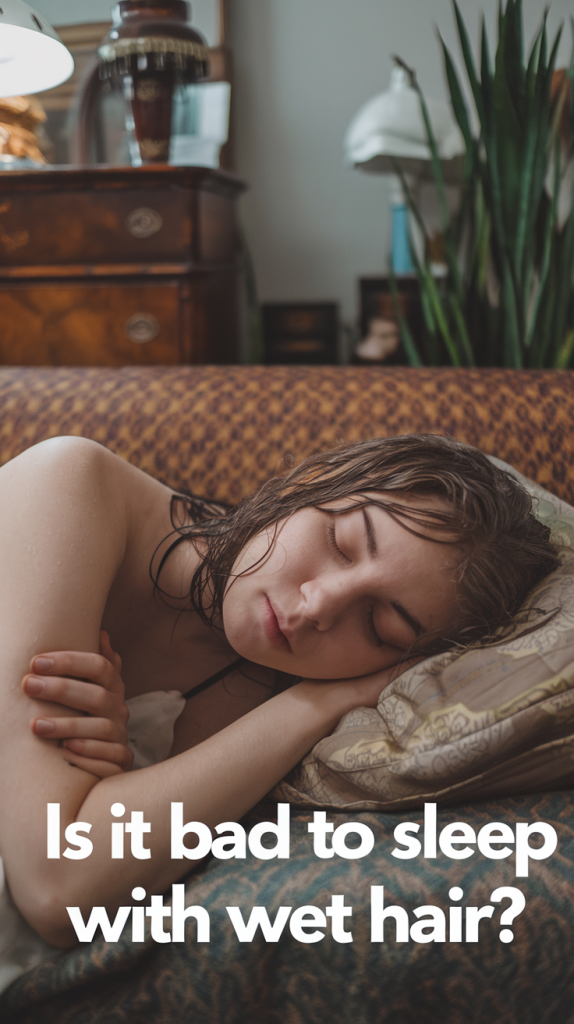Is It Bad to Sleep With Wet Hair?
We’ve all done it—skipping the blow-dryer after a late shower and going straight to bed with damp hair. But have you ever wondered if this habit is harmful? On the surface, it may seem harmless, but sleeping with wet hair can lead to unexpected problems for your hair, scalp, and even skin. On my personal journey to healthier hair, I’ve learned a lot about this seemingly small habit. Let’s unpack the truth, explore practical solutions, and determine whether it’s bad to sleep with wet hair.
What Happens to Wet Hair While You Sleep
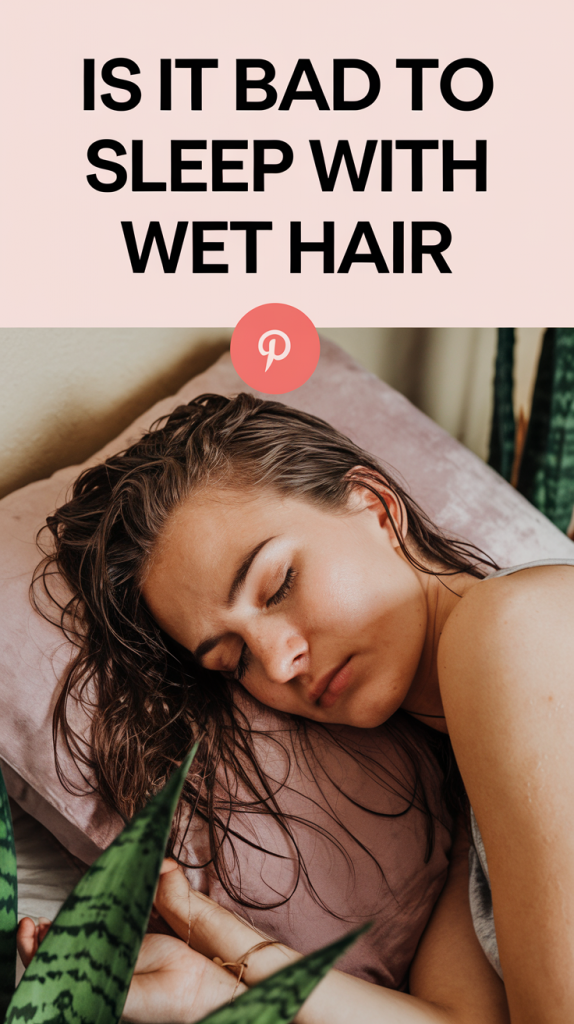
Wet Hair and Its Fragile State
Hair is weakest when wet. Its protective outer layer, the cuticle, lifts and swells, making strands vulnerable to damage. Tossing and turning at night adds friction, which can lead to:
- Breakage: Strands snap easily when wet.
- Split Ends: The increased friction weakens hair over time.
- Frizz: A lifted cuticle allows moisture to escape, resulting in an unmanageable look.
How It Affects Different Hair Types
| Hair Type | Impact of Sleeping Wet |
|---|---|
| Curly or Coarse | Increased frizz and tangles |
| Fine | High susceptibility to breakage |
| Chemically Treated | Further damage to already weakened strands |
Sleeping wet poses challenges for everyone, but fine or treated hair needs extra care.
The Impact on Scalp and Skin
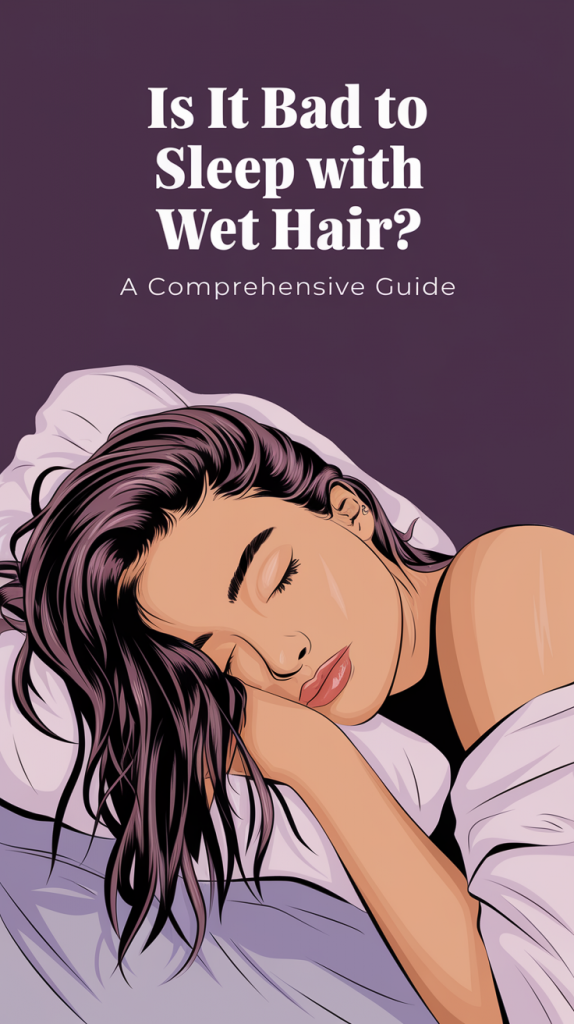
Risks to Your Scalp
Sleeping with damp hair creates a moist environment that encourages the growth of fungi and bacteria. These can lead to:
- Dandruff and Flakiness: Damp conditions can worsen dandruff.
- Fungal Infections: Warm, moist scalps are ideal for fungal growth, potentially leading to conditions like seborrheic dermatitis.
- Unpleasant Odors: A perpetually damp scalp can emit an unwanted smell.
Skin Concerns
Wet hair can dampen pillowcases, transferring bacteria to your skin and increasing the risk of acne or irritation. Keeping both your hair and pillow dry is essential for clear, healthy skin.
| Problem | Cause |
|---|---|
| Acne | Bacteria transfer from damp bedding |
| Skin Irritation | Wet pillowcases rubbing against skin |
Debunking Myths About Sleeping With Wet Hair
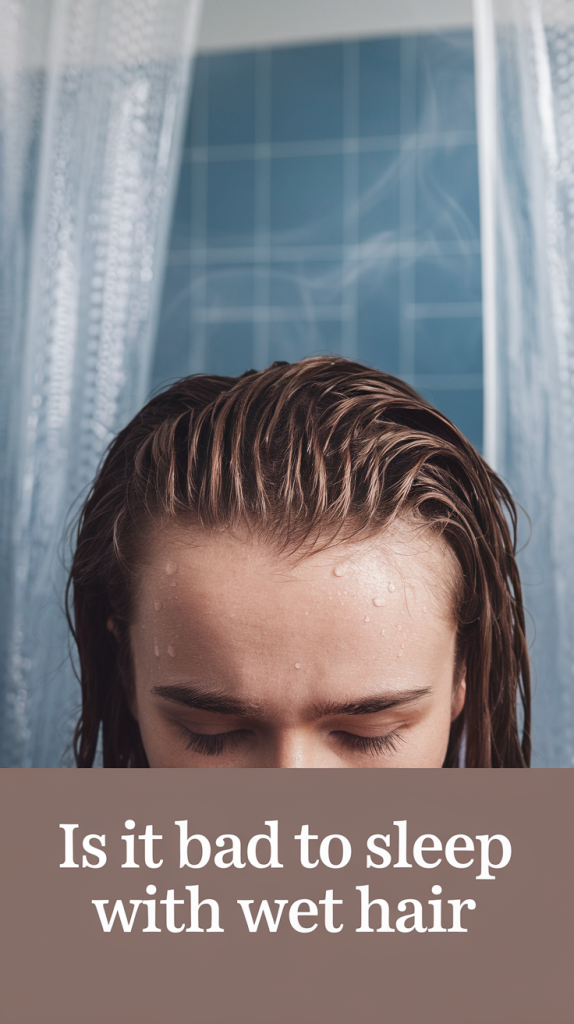
Myth vs. Reality
- “Sleeping wet causes colds.”
This is false. Colds are caused by viruses, not damp hair. - “It helps hair grow faster.”
Another myth—hair growth is dictated by genetics and overall health. - “It’s fine if you tie it back.”
Tying damp hair can increase breakage and damage, especially if the hair is pulled tight.
How to Minimize Damage
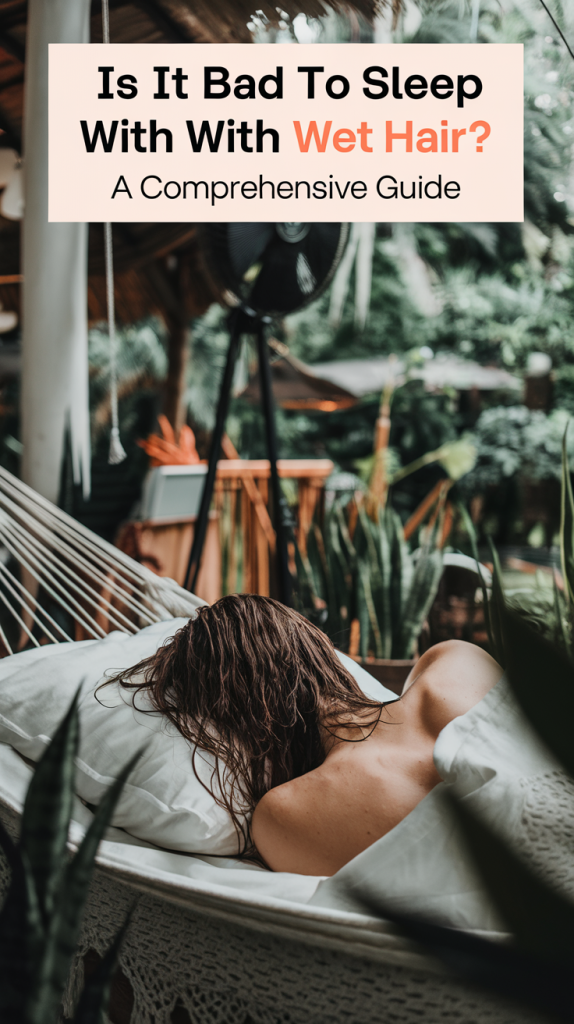
Practical Tips
If drying your hair completely before bed isn’t an option, here are steps to minimize harm:
- Towel Dry Gently: Use a microfiber towel to remove excess moisture without causing friction.
- Apply Leave-In Conditioner: This protects the cuticle and minimizes damage.
- Switch to a Silk Pillowcase: Silk or satin pillowcases reduce friction and help retain moisture in your hair.
- Loose Hairstyles Only: Avoid tight ponytails or buns; opt for a loose braid instead.
Hair Drying Options
| Drying Method | Benefits |
|---|---|
| Air Drying | Gentle and natural |
| Blow Drying (Low Heat) | Fast and reduces moisture retention |
| Quick-Dry Products | Accelerates the drying process |
Long-Term Effects of the Habit
Repeatedly sleeping with wet hair can lead to chronic issues such as:
- Weakened Hair: Prolonged exposure to friction and moisture weakens the hair shaft.
- Recurring Scalp Problems: Persistent dampness can aggravate dandruff or fungal conditions.
- Texture Changes: Hair may become frizzier or lose its smoothness over time.
FAQs
1. Can sleeping with wet hair cause permanent damage?
Habitually sleeping with wet hair can weaken your strands over time, leading to long-term texture changes and thinning.
2. What’s the safest way to sleep with wet hair?
Dry it as much as possible, braid it loosely, and use a silk pillowcase to minimize damage.
3. Does wet hair worsen existing scalp issues?
Yes. Conditions like dandruff or seborrheic dermatitis can worsen due to prolonged dampness.
4. Can wet hair affect chemically treated hair?
Absolutely. Chemically treated hair is more porous and susceptible to damage.
5. Does wet hair increase acne risk?
Yes. A damp pillowcase can harbor bacteria that transfer to your skin, increasing breakouts.
6. Are there any benefits to sleeping with wet hair?
Styling benefits may be achieved, but the risks generally outweigh the advantages.
Conclusion
Sleeping with wet hair may seem convenient, but the potential risks to your hair, scalp, and skin are significant. From breakage to bacterial growth, the downsides can affect both your appearance and health. On the rare occasion you sleep with damp hair, take precautions like using a silk pillowcase or applying a protective product.
On my journey to healthier hair, I’ve found that small changes to my nighttime routine—like air-drying earlier or investing in quick-dry sprays—made all the difference. Try these tips, and you’ll wake up with hair that feels stronger and looks its best.
What are your thoughts on sleeping with wet hair? Share your experiences and tips in the comments!
